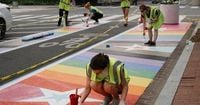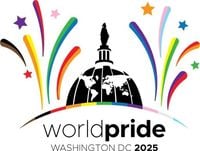Washington, D.C., is wrapping up a landmark weekend as it hosts WorldPride 2025, an international LGBTQ+ festival marking the 50th anniversary of Pride celebrations in the nation’s capital. The event, which has drawn hundreds of thousands over several days, culminated in a vibrant parade on June 7, 2025, starting in one of the city’s historic gay neighborhoods and concluding at the U.S. Capitol.
WorldPride’s return to D.C. is historic: it is the first time since the festival’s inaugural event in Rome in 2000 that the U.S. capital has played host. The celebration, themed "Fabric of Freedom," highlights the rich history, diverse identities, and resilience of the LGBTQ+ community amid growing political challenges.
Yet, beneath the colorful banners and spirited festivities lies a tense atmosphere shaped by the current political environment. The return of President Donald Trump to the White House in January 2025 has cast a long shadow over the event. His administration swiftly enacted a series of executive orders that significantly rolled back transgender rights. These include banning transgender people from military service, restricting gender identities on travel documents, and cutting federal support for gender-affirming care for minors.
These moves have sown unease within the queer community. Several members expressed reservations about attending Pride events this year, fearing repercussions at work or in their personal lives. The atmosphere of uncertainty was compounded by the withdrawal of several high-profile corporate sponsors, including Booz Allen Hamilton, a major federal contractor, who cited the administration’s stance on diversity, equity, and inclusion (DEI) initiatives as a reason for pulling support.
Ryan Bos, executive director of the Capital Pride Alliance, reflected on the uncertainty that surrounded the city’s selection as host for WorldPride well before the 2024 election. "The election was the biggest question," he said, acknowledging concerns from international Pride groups about holding the event under an administration perceived as hostile to LGBTQ+ rights.
The festival itself has been a sprawling affair, featuring concerts, art shows, sports events, and conferences, with headline performances by Jennifer Lopez, Troye Sivan, RuPaul, and Cynthia Erivo. The WorldPride Music Festival, held on June 6 and 7, drew crowds along Pennsylvania Avenue, while the International March on Washington on June 8 gathered activists and allies in front of the Capitol. Despite this, attendance fell short of early projections, with hotel bookings about 4 percent below last year’s figures for the same weekend.
Organizers adapted to challenges by moving events from venues like the Kennedy Center—now under the administration’s oversight and having canceled several scheduled Pride events—to other local spaces. They also supported the "March For All" initiative, encouraging participation on behalf of those unable to attend.
One particularly controversial moment was the National Park Service’s decision to fence off Dupont Circle, a neighborhood park revered as the heart of D.C.’s LGBTQ+ community and a traditional gathering spot during Pride. The closure, initially requested by D.C. Police Chief Pamela Smith to prevent vandalism and disorderly conduct, sparked widespread backlash. Local officials and activists likened the move to cordoning off Stonewall in New York or the Castro in San Francisco, iconic sites of queer history and protest.
Zachary Parker, an openly gay city council member, called Dupont Circle "sacred ground" and condemned its closure during the festival as sending "the wrong message." LGBTQ+ advocate Zar described the decision as "motivated by animus," suggesting it was a tactical move to disrupt the community’s celebrations.
Though Chief Smith rescinded her closure request after public outcry, the Park Service, which answers to the White House, maintained the fence. Mayor Muriel Bowser called the initial request an "unfortunate error" and said her administration was working to find alternative spaces. The episode underscored the unique challenges of managing local events in a city where the federal government owns 90 percent of open spaces, complicating community control over public parks.
The political backdrop extends beyond local disputes. Defense Secretary Pete Hegseth recently ordered a review of the Navy’s 2021 decision to name a ship after Harvey Milk, a pioneering gay rights activist and Navy veteran, signaling further federal resistance to LGBTQ+ recognition.
Meanwhile, the broader cultural climate has shifted. The Trump administration’s anti-DEI campaign has led many corporations to withdraw support from Pride events nationwide, revealing the fragility of mainstream corporate backing for LGBTQ+ rights. Pia Carusone, a political media consultant and owner of a queer-owned distillery, lamented that the community "should never have just turned over the market share of the LGBTQ+ community to a bunch of people that really don’t care about us and are willing to sell us out for a higher stock price."
Despite these headwinds, many see this year’s Pride as a return to its roots. Zach Renovátes, co-owner of a D.C. LGBTQ+ nightclub, reminded that "Pride started as a protest," born from defiance against police violence at Stonewall in 1969. The current political climate, with its rapid rollbacks and hostility, has rekindled that spirit of resistance.
Transgender advocates have been particularly targeted. Marissa Miller, a Chicago-based transgender advocate, noted that trans and nonbinary people have been "on the menu for the last 15 years," facing sustained attacks. This year’s events included a summit on trans policy and safety hosted by Dr. Elijah Nicholas, a trans man and retired Air Force officer, who emphasized the need for a deliberate, security-conscious approach amid rising threats.
Yet, the community’s resilience shines through. The festival’s extensive programming—from the Capital Cup Sports Festival featuring over 20 sports to the WorldPride Film Festival and Human Rights Conference—reflects a vibrant, multifaceted celebration of identity and activism.
Still, the silence surrounding the cancellation of certain events, such as the Kennedy Center’s withdrawal of its "Tapestry of Pride" performances and the canceled "A Peacock Among Pigeons" concert, speaks volumes about the administration’s influence.
Looking back, some lament the missed opportunity that WorldPride 2025 represented. An editorial reflecting on the event’s quiet start noted that Pride Month began "not with outrage, not with defiance—but with silence," a stark contrast to the bold acts of resistance that defined earlier decades.
As the weekend’s festivities close, the LGBTQ+ community in Washington and beyond faces a complex future. The challenges posed by political hostility and federal control of local spaces underscore ongoing struggles, yet the spirit of Pride—rooted in visibility, protest, and unity—remains unbroken.
WorldPride 2025 in Washington, D.C., has been more than a celebration; it has been a testament to endurance in the face of adversity, a fabric woven from struggle and hope, binding a community determined to move forward.


